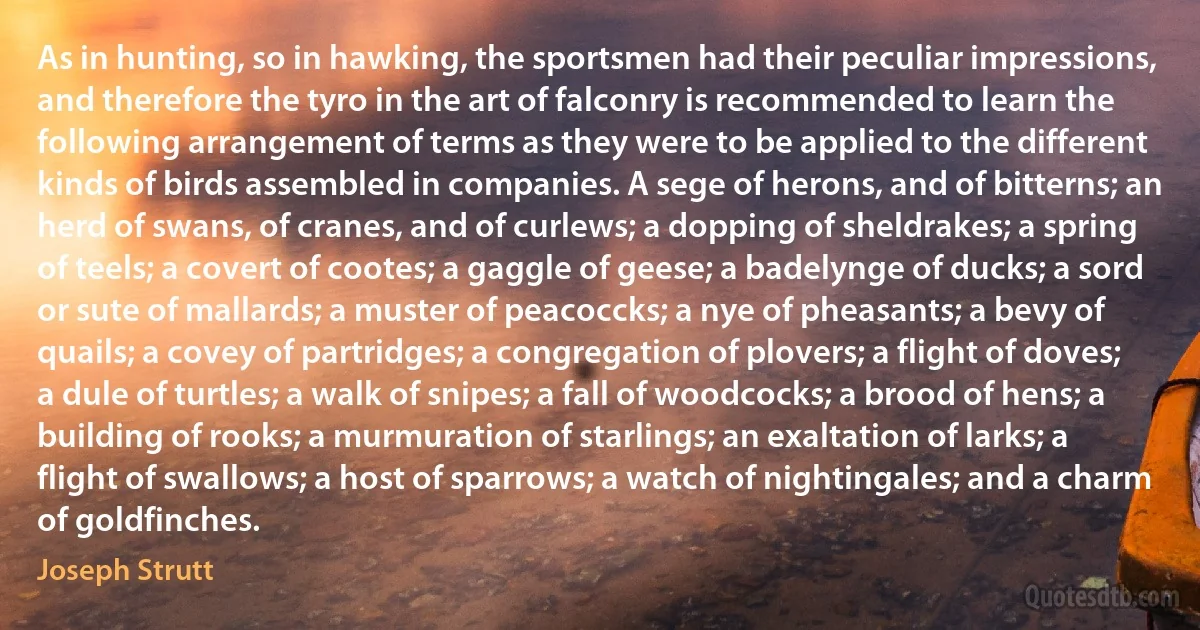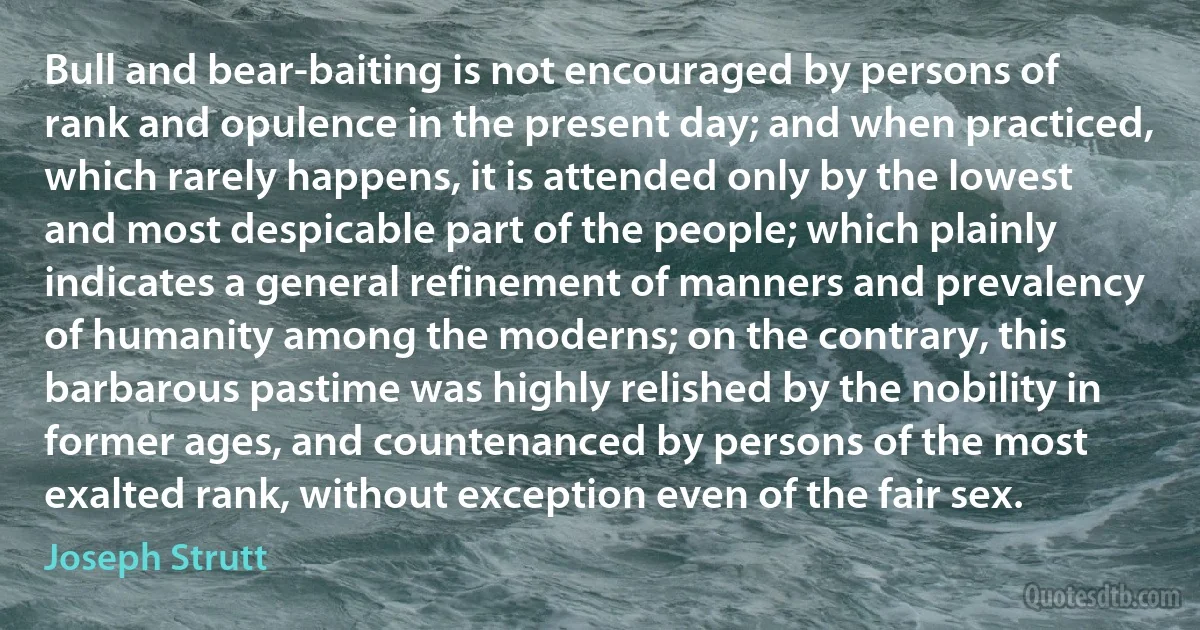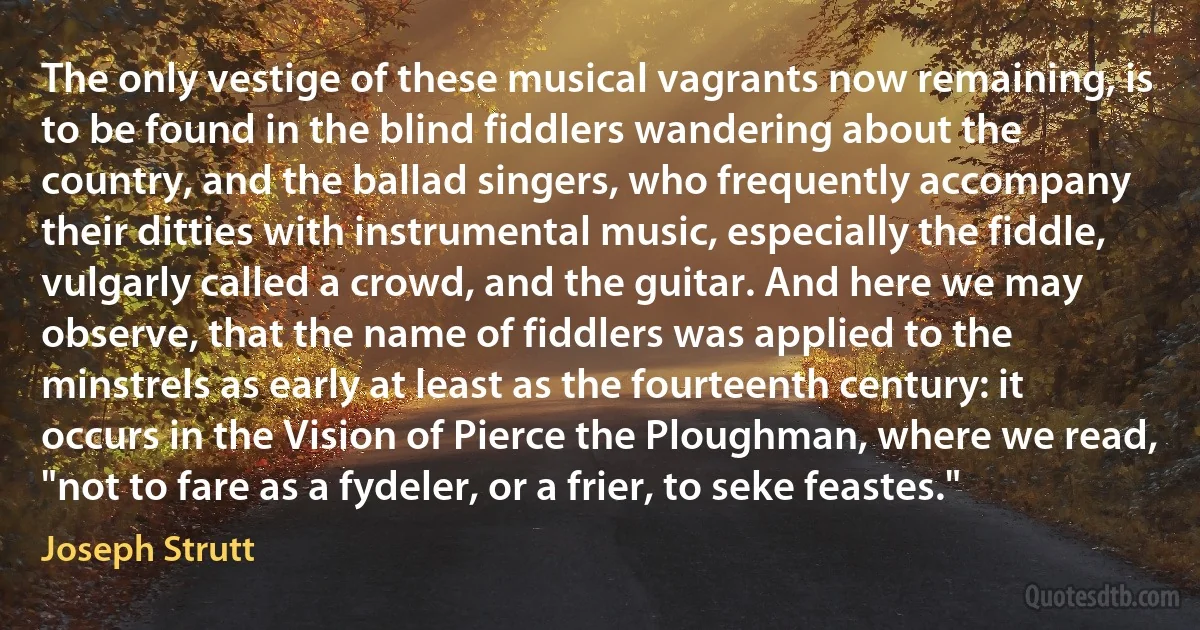Joseph Strutt quotes - page 2
I do not know a greater fault in the nurture of children than the conniving at the wanton acts of barbarity which they practise at an early age upon innocent insects; the judgment of that parent must be exceedingly defective, or strangely perverted, who can proportion the degree of cruelty to the smallness of the creature that unfortunately becomes the sufferer. It is but a fly, perhaps he may say, when he sees his child pluck off its wings or its legs by way of amusement; it is but a fly, and cannot feel much pain; besides the infant would cry if I was to take it from him, and that might endanger his health, which surely is of more consequence than many flies: but I fear worse consequences are to be dreaded by permitting it to indulge so vicious an inclination, for as it grows up, the same cruelty will in all likelihood be extended to larger animals, and its heart by degrees made callous to every claim of tenderness and humanity.

Joseph Strutt
It appears that soon after the introduction of bowling-alleys they were productive of very evil consequences; for they became not only exceedingly numerous, but were often attached to places of public resort, which rendered them the receptacles of idle and dissolute persons; and were the means of promoting a pernicious spirit of gambling among the younger and most unwary part of the community. The little room required for making these bowling-alleys was no small cause of their multiplication, particularly in great towns and cities. In the fifteenth and sixteenth centuries these nurseries of vice were universally decried, and especially such of them as were established within the city and suburbs of London, where the ill effects arising from them were most extensive.

Joseph Strutt
In order to give the better effect to this diversion, a hole is dug in the ground for the retreat of the animal; and the dogs run at him singly in succession; for it is not usual, I believe, to permit any more than one of them to attack him at once; and the dog which approaches him with the least timidity, fastens upon him the most firmly, and brings him the soonest from his hole, is accounted the best. The badger was formerly called the "grey," hence the denomination of grey-hounds applied to a well known species of dogs, on account of their having been generally used in the pursuit of this animal.

Joseph Strutt
The grand fauconnier of France was an officer of great eminence; his annual salary was four thousand florins; he was attended by fifty gentlemen, and fifty assistant falconers; he was allowed to keep three hundred hawks, he licensed every vender of hawks in France, and received a tax upon every bird sold in that kingdom, and even within the verge of the court; and the king never rode out upon any occasion of consequence without this officer attending upon him.

Joseph Strutt
According to the ritual of the Romish church, the bells were not only blessed and exorcised, but baptized as those above mentioned, and anointed with holy oil. After these ceremonies had passed it was believed that the evil spirits lurking in the air might be driven away by their sound.

Joseph Strutt
Yet, we are well assured that learning did not form any prominent feature in the education of a young nobleman during the Saxon government: it is notorious, that Alfred the Great was twelve years of age before he learned to read; and that he owed his knowledge of letters to accident, rather than to the intention of his tutors. A book adorned with paintings in the hands of his mother, attracted his notice, and he expressed his desire to have it: she promised to comply with his request on condition that he learned to read it, which it seems he did; and this trifling incident laid the groundwork of his future scholarship.

Joseph Strutt
The universality of card-playing in the reign of this monarch is evident from a prohibitory statute being necessary to prevent apprentices from using cards except in the Christmas holidays, and then only in their masters' houses...But this moderation, I apprehend, was by no means general, for several contemporary writers are exceedingly severe in their reflections upon the usage of cards, which they rank with dice, and consider both as destructive to morality and good order.

Joseph Strutt
The romantic notions of chivalry appear to have lost their vigour towards the conclusion of the fifteenth century, especially in this country, where a continued series of intestine commotions employed the exertions of every man of property, and real battles afforded but little leisure to exercise the mockery of war.

Joseph Strutt
Stow informs us, that the young Londoners, on holidays, after the evening prayer, were permitted to exercise themselves with their wasters and bucklers before their masters' doors...The bear-gardens were the usual places appropriated by the masters of defence for public trials of skill. These exhibitions were outrageous to humanity, and only fitted for the amusement of ferocious minds; it is therefore astonishing that they should have been frequented by females; for, who could imagine that the slicing of the flesh from a man's cheek, the scarifying of his arms, or laying the calves of his legs upon his heels, were spectacles calculated to delight the fair sex, or sufficiently attractive to command their presence.

Joseph Strutt
We may also observe, that, upon these occasions, the female Nimrods dispensed with the method of riding best suited to the modesty of the sex, and sat astride on the saddle like the men; but this indecorous custom, I trust, was never general, nor of long continuance, even with the heroines who were most delighted with these masculine exercises. An author of the seventeenth century speaks of another fashion, adopted by the fair huntresses of the town of Bury in Suffolk. "The Bury ladies," says he, "that used hawking and hunting, were once in a great vaine of wearing breeches," which it seems gave rise to many severe and ludicrous sarcasms. The only argument in favour of this habit, was decency in case of an accident. But in a manner more consistent with the delicacy of the sex, that is, by refraining from those dangerous recreations.

Joseph Strutt
A state of princes; a skulk of friars; a skulk of thieves; an observance of hermits; a lying of pardoners; a subtiltie of serjeants; an untruth of sompners; a multiplying of husbands; an incredibility of cuckolds; a safeguard of porters; a stalk of foresters; a blast of hunters; a draught of butlers; a temperance of cooks; a melody of harpers; a poverty of pipers; a drunkenship of coblers; a disguising of taylors; a wandering of tinkers; a malepertness of pedlars; a fighting of beggars; a rayful, (that is, a netful) of knaves; a blush of boys; a bevy of ladies; a nonpatience of wives; a gagle of women; a gagle of geese; a superfluity of nuns; and a herd of harlots. Similar terms were applied to inanimate things, as a caste of bread, a cluster of grapes, a cluster of nuts, &c.

Joseph Strutt
The first class contains four, which, we are informed, may be properly called beasts for hunting; namely, the hare, the hart, the wolf, and the wild boar. The second class contains the names of the beasts of the chase, and they are five; that is to say, the buck, the doe, the fox, the martin, and the roe. In the third class we find three, that are said to afford "greate dysporte" in the pursuit, and they are denominated, the grey or badger, the wild-cat and the otter...The reader may possibly be surprised, when he casts his eye over the foregoing list of animals for hunting, at seeing the names of several that do not exist at this time in England, and especially of the wolf, because he will readily recollect the story so commonly told of their destruction during the reign of Edgar.

Joseph Strutt
If a gentleman, or an inferior thane, killed a stag in the king's forests, he was degraded from his rank; if a ceorl, or husbandman, committed the same offence, he was reduced to slavery; and if a slave killed one, he suffered death. Magistrates were appointed, in every county, or shire, to put these laws in execution, and under them were appointed inferior officers or gamekeepers, whose province it was to apprehend the offenders.

Joseph Strutt
The laws of chivalry required that every knight should pass through two offices: the first was a page; and, at the age of fourteen, he was admitted an esquire. The office of the esquire consisted of several departments; the esquire for the body, the esquire of the chamber, the esquire of the stable, and the carving esquire; the latter stood in the hall at dinner, carved the different dishes, and distributed them to the guests. Several of the inferior officers had also their respective esquires.

Joseph Strutt
The king then kept his Christmas at his castle at Guildford; the dresses are said to be ad faciendum ludos domini regis, and consisted of eighty tunics of buckram of various colours; forty-two visors of different similitudes, namely, fourteen of faces of women, fourteen of faces of men, and fourteen heads of angels made with silver; twenty-eight crests; fourteen mantles embroidered with heads of dragons; fourteen white tunics wrought with the heads and wings of peacocks; fourteen with the heads of swans with wings; fourteen tunics painted with the eyes of peacocks; fourteen tunics of English linen painted; and fourteen other tunics embroidered with stars of gold.

Joseph Strutt
The increasing demand for these objects of amusement, it is said, suggested the idea of cutting the outlines appropriated to the different suits upon separate blocks of wood and stamping them upon the cards; the intermediate spaces between the outlines were filled up with various colours laid on by the hand. This expeditious method of producing cards reduced the price of them, so that they might readily be purchased by almost every class of persons: the common usage of cards was soon productive of serious evils, which all the exertions of the legislative power have not been able to eradicate.

Joseph Strutt
The art of wrestling, which in the present day is chiefly confined to the lower classes of the people, was, however, highly esteemed by the ancients, and made a very considerable figure among the Olympic games. In the ages of chivalry, to wrestle well was accounted one of the accomplishments which a hero ought to possess. Wrestling is a kind of exercise that, from its nature, is likely to have been practiced by every nation, and especially by those the least civilised. It was probably well known in this country long before the introduction of foreign manners.

Joseph Strutt
In an old Chronicle of Norway, we find it recorded of Olaf Tryggeson, a king of that country, that he was stronger and more nimble than any man in his dominions. He could climb up the rock Smalserhorn, and fix his shield upon the top of it; he could walk round the outside of a boat upon the oars, while the men were rowing; he could play with three darts, alternately throwing them in the air, and always kept two of them up, while he held the third in one of his hands; he was ambidexter, and could cast two darts at once; he excelled all the men of his time in shooting with the bow; and he had no equal in swimming.

Joseph Strutt
According to some of the pious writers of antiquity, they made large fires, which might be seen at a great distance, upon the vigil of this saint [John], in token that he was said in holy writ to be "a shining light." Others, agreeing with this, add also, these fires were made to drive away the dragons and evil spirits hovering in the air; and one of them gravely says, in some countries they burned bones, which was called a bone-fire; for "the dragons hattyd nothyng mor than the styncke of brenyng bonys." This, says another, habent ex gentilibus, they have from the heathens. The author last cited laments the abuses committed upon thes occasions. "this vigil," says he, "ought to be held with cheerfulness and piety, but not with such merriment as is shewn by the profane lovers of this world, who make great fires in the streets, and indulge themselves with filthy and unlawful games, to which they add glotony and drunkenness, and the commission of many other shameful indecencies."

Joseph Strutt
The English are particularised for their partiality to strange sights; uncommon beasts, birds, or fishes, are sure to attract their notice, and especially such of them as are of the monstrous kind; and this propensity of our countrymen is neatly satirised by Shakspeare in the Tempest; where Stephano, seeing Calaban lying upon the stage, and being uncertain whether he was a fish, a beast, or one of the inhabitants of the island, speaks in the following manner: "Were I in England now, as once I was, and had this fish painted, not a holiday fool there but would give me a piece of silver. There would this monster make a man: any strange beast there makes a man. When they will not give a doit to relieve a lame beggar, they will lay out ten to see a dead Indian." Indeed, we may observe that a cow with two heads, a pig with six legs, or any other unnatural production, with proper management, are pretty certain fortunes to the possessors.

Joseph Strutt



